Even though he was not the main writer of it, Brian Michael Bendis was deep in Marvel's Civil War event both behind the scenes and on the page. Along with the New Avengers tie-in issues, he also wrote a prologue and epilogue for it. And wow, what a difference this made. Civil War was the status quo altering event that Avenger Disassembled wanted to be, and it was like a new beginning for Bendis with him firing on all cylinders.
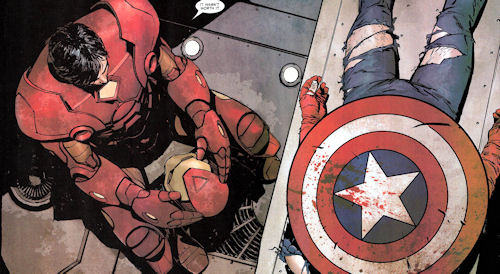
Suddenly, New Avengers had a sense of direction and identity it had previously been lacking. It was no longer Bendis' All-Stars in the role of the Avengers. Now, New Avengers was the renegade team of the Marvel Universe with Mighty Avengers as its establishment counterpart. Splitting Bendis between two distinct Avengers titles somehow had the effect of bringing greater focus in on what he wanted to do. Things were clicking into place, and Bendis no longer seemed like he was out of his element with what was now an Avengers franchise.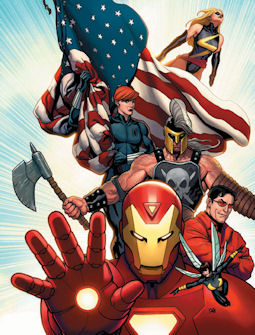 Though not the more popular of the two, Mighty Avengers was my own personal favorite. It showed that not only was Bendis willing now to go outside of his comfort zone but that he could do it well. Mighty Avengers had a cast far more in line with what people commonly thought of as Avengers. In fact, it lacked any characters whom readers would have considered "Bendis characters" with perhaps the exception of Black Widow. But no one doubted her qualifications as an Avenger anyway. It starred other common Avengers like Iron Man, Ms. Marvel, Wasp and Wonder Man, and it included the Sentry and Ares, as reimagined by Michael Avon Oeming, to make the team feel like something we hadn't before.
Though not the more popular of the two, Mighty Avengers was my own personal favorite. It showed that not only was Bendis willing now to go outside of his comfort zone but that he could do it well. Mighty Avengers had a cast far more in line with what people commonly thought of as Avengers. In fact, it lacked any characters whom readers would have considered "Bendis characters" with perhaps the exception of Black Widow. But no one doubted her qualifications as an Avenger anyway. It starred other common Avengers like Iron Man, Ms. Marvel, Wasp and Wonder Man, and it included the Sentry and Ares, as reimagined by Michael Avon Oeming, to make the team feel like something we hadn't before.
The only real unfortunate thing about Mighty Avengers was that much of what Bendis had set up didn't amount to much in it. His stay on this book was too shortlived, giving us only a couple story arcs before breaking into tie-in issues for Secret Invasion. Marvel's rush to its next event blockbuster left Mighty Avengers as just a footnote of Bendis' overall run. Had it just been given another year to development, it likely would have been much more than that.
Civil War really was the best thing that could have happened to New Avengers. It really gave Bendis an excuse to present a different vision for the Avengers without feeling forced into being as it had with Avengers Disassembled. As a renegade team low on resources, it was natural that they would be a little more grounded and street-level than what people expect of the Avengers. The absence of Captain America also created an opening for Luke Cage to step up as the moral authority figure who would stubbornly refuse to back down, and this was where Luke's status as an Avengers-level character really began to cement itself.
It was at this point in New Avengers when Bendis brought in probably his least controversial new Avenger. Reactions to Dr. Strange joining generally ranged from "Well, yeah. Sorcerer Supreme." to "Wait -- how was he not an Avenger already?" with the readership. It also wasn't a choice that came out of nowhere. Intentionally or not, Bendis had set up Dr. Strange by including him in Avengers Disassembled and as a member of the Illuminati. However, using Dr. Strange was clearly a struggle for Bendis at first. There was a reason the character hadn't really been used a regular member of the team. Magic is cheap in comics, and as things went on, some began criticizing Bendis' portrayal of Dr. Strange as too weak because the good doctor wasn't simply magicking away all of the team's problems. The problems with having such a powerfully all-purpose character around eventually led to Bendis writing him out of the team.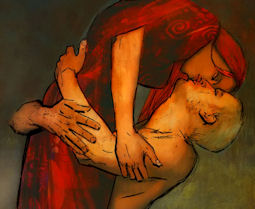 The new member that really grabbed readers' attentions was the return of Clint Barton, though somewhat controversially not as Hawkeye. The resurrected Barton was the next to adopt the wayward Ronin identity under the conceit that he was angry with how things turned out in his absence and didn't want to let the world know Hawkeye was alive. For some, this worked, and for others, it didn't. There was still some resent that Barton had ever been killed off in the first place. It worked for me, though I thought it was silly he didn't use a bow as Ronin. A bow would've fit the identity's motiffe just as well as the swords and hardly would've given him away completely. But for all of the outrage, Barton's death and return had the effect of sparking more interest in the character than had existed for a long time.
The new member that really grabbed readers' attentions was the return of Clint Barton, though somewhat controversially not as Hawkeye. The resurrected Barton was the next to adopt the wayward Ronin identity under the conceit that he was angry with how things turned out in his absence and didn't want to let the world know Hawkeye was alive. For some, this worked, and for others, it didn't. There was still some resent that Barton had ever been killed off in the first place. It worked for me, though I thought it was silly he didn't use a bow as Ronin. A bow would've fit the identity's motiffe just as well as the swords and hardly would've given him away completely. But for all of the outrage, Barton's death and return had the effect of sparking more interest in the character than had existed for a long time.
The Hood turned out to be the next on Bendis' list of lesser known characters to bring into the spotlight. Up until this point, the Hood only existed as far as Brian K. Vaughan's MAX series starring the character. Now, Bendis was turning the Hood into one of the top villains in his Avengers run. In response to the Initiative, the Hood was the one to come up with the idea of doing a criminal version of it by organizing as many supercriminals as possible into one big, cooperative gang. Some readers and even writers tended to mischaracterize this as the Hood being the new Kingpin, but what Bendis was doing was far less like Wilson Fisk and more like Captain Cold from the DC Universe. The Hood was a working class criminal whose common sense at the right time paid off.
However, the Hood's rise led to one of the most infamous and unforgivable moments marring the Bendis era. The Hood's brutal attack on Tigra made a lot of people angry. It added fuel to that constantly burning fire of how comic writers tend to treat female characters, even though Bendis had generally been one of Marvel's best writers in regard to using and promoting female characters. This was a major exception, though. Usually when Bendis did something bad to a character, it came back around in a way that made the characters better than before. The Scarlet Witch's madness, Hawkeye's death and Vision's destruction all resulted in more interesting roles for that characters than they previously had. This was far from the case for Tigra. The natural progression of what happened to her would have been for her to go after the Hood by leaving the pro-registration side of things to join the New Avengers. Instead, she was left in her much lesser role in an Avengers spinoff book, where she got knocked up by a Skrull.
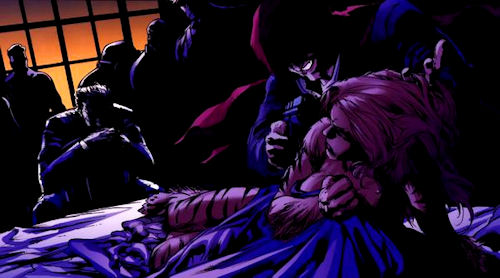
Skrulls, skrulls, skrulls. That was what this period of Bendis' run was really about. It wasn't long after Civil War that he revealed his big idea. Skrulls had invaded Earth and could be posing as anyone. This was a brilliant idea, and I was always shocked it hadn't been done in a big way like this before. It was such an obvious thing to do with the Skrulls. Throughout all of the stories he was telling, he was also playing with the idea that anyone in them could be a Skrull.
Secret Invasion really showed that Bendis had found his footing with the Avengers. It was an event that far surpassed his previous attempts with House of M and Avengers Disassembled. It wasn't perfect, having problems with decompression or other things, but it turned out pretty damn good. It even balanced out some of its problems with giving us character moments most big events typically gloss over in favor of action beats or getting to the next cliffhanger ending.
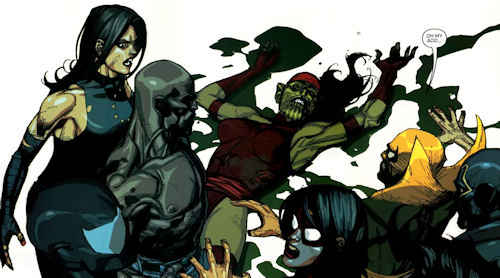
What probably hurt Secret Invasion the most was that Bendis turned out not to be willing to go as far with his Skrull infiltrators as the hype suggested. When Marvel hyped that some characters had been Skrulls for "years," they apparently meant in real-time, because in comic-time, it amounted to more like a few months. Most infiltrations happened during Bendis' time on the Avengers or shortly before it started with only one or two strange exceptions. People were left expecting big continuity-altering reveals that weren't delivered upon, because Bendis and Marvel had decided to play it especially safe. The only two exceptions were Spider-Woman and Mockingbird. It was a brave move by Bendis to reveal that Spider-Woman had been a Skrull the entire time he had been writing her. It ran the risk of undoing the gains he had made with returning Jessica Drew to the spotlight. And Mockingbird turned out to be the only Marvel character to have been taken by the Skrulls for a substantial amount of time, resulting in her return from the dead.
From Civil War to Secret Invasion, Brian Michael Bendis succeeded in turning things around. He evolved his writing style and rendered some of the major complaints against his Avengers work moot. With Mighty Avengers, he showed that he could write a more traditional version of the team. And with New Avengers, he proved he could make his own more grounded version of one work just as well.
Next would come Dark Reign, when best of Bendis' run would come.